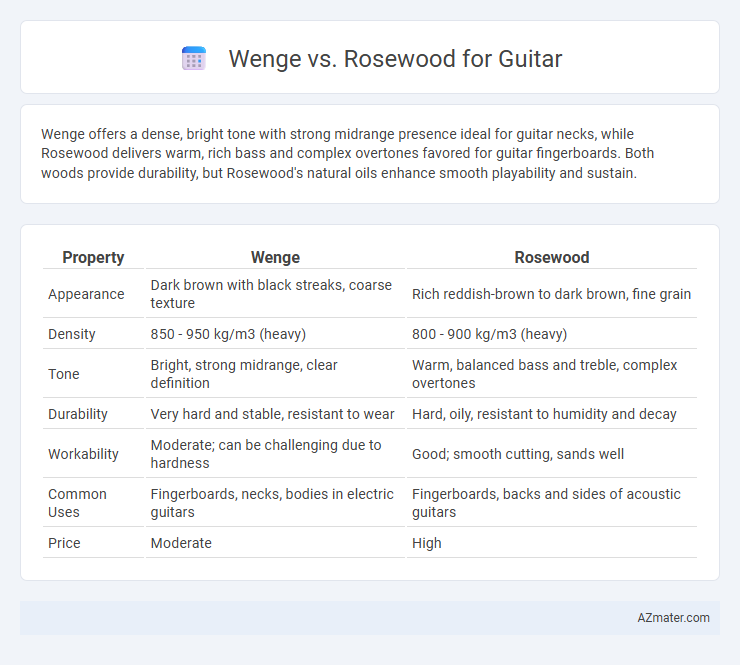Wenge offers a dense, bright tone with strong midrange presence ideal for guitar necks, while Rosewood delivers warm, rich bass and complex overtones favored for guitar fingerboards. Both woods provide durability, but Rosewood's natural oils enhance smooth playability and sustain.
Table of Comparison
| Property | Wenge | Rosewood |
|---|---|---|
| Appearance | Dark brown with black streaks, coarse texture | Rich reddish-brown to dark brown, fine grain |
| Density | 850 - 950 kg/m3 (heavy) | 800 - 900 kg/m3 (heavy) |
| Tone | Bright, strong midrange, clear definition | Warm, balanced bass and treble, complex overtones |
| Durability | Very hard and stable, resistant to wear | Hard, oily, resistant to humidity and decay |
| Workability | Moderate; can be challenging due to hardness | Good; smooth cutting, sands well |
| Common Uses | Fingerboards, necks, bodies in electric guitars | Fingerboards, backs and sides of acoustic guitars |
| Price | Moderate | High |
Introduction: Wenge vs Rosewood for Guitar
Wenge and rosewood are two popular tonewoods used in guitar construction, each offering distinct tonal and aesthetic qualities. Wenge provides a bright, focused sound with strong midrange presence, while rosewood is known for its warm, rich tones and deep bass response. The choice between wenge and rosewood influences the guitar's overall resonance, sustain, and appearance, catering to different playing styles and preferences.
Visual Differences: Wenge and Rosewood Aesthetics
Wenge features a dark brown to black color with distinctive, bold grain patterns that create a striped appearance, while rosewood offers a wide range of hues from deep reddish-brown to purplish tones with smoother, swirling grains. The contrast in Wenge's grain adds a contemporary, striking look to guitars, whereas rosewood provides a classic, warm aesthetic often favored for fretboards and backs. These visual differences make Wenge a standout choice for bold designs and rosewood ideal for traditional, elegant instrument finishes.
Tonewood Characteristics: Comparing Sound Profiles
Wenge offers a bright, clear tone with pronounced midrange and tight bass response, making it ideal for articulate fingerstyle and percussive playing. Rosewood is renowned for its rich, warm sound, strong bass, and complex overtones, providing a full-bodied tone favored in blues and jazz genres. Both tonewoods enhance guitar resonance, but Wenge emphasizes clarity and attack, while Rosewood delivers depth and sustain.
Durability and Hardness: Which Wood Lasts Longer?
Wenge and rosewood both offer exceptional durability and hardness, but wenge has a Janka hardness rating of approximately 1630, making it slightly harder and more resistant to wear than most rosewood varieties, which average around 1500 to 2200 depending on the species. Wenge's dense, coarse grain structure enhances its resilience against impact and wear, contributing to longer-lasting guitars, especially in high-contact areas like fretboards and necks. Rosewood, while durable and prized for its tonal warmth, may be more prone to surface wear and dents over time compared to the tougher wenge wood.
Weight and Playability: Impact on Guitar Comfort
Wenge is significantly denser than rosewood, resulting in heavier guitars that may cause fatigue during extended playing sessions. Rosewood offers a lighter alternative, enhancing playability and comfort, especially for long performances or practice. The choice between wenge and rosewood directly affects the guitar's balance, weight distribution, and overall ergonomic feel.
Workability: Crafting with Wenge vs Rosewood
Wenge offers exceptional workability for guitar crafting due to its dense, yet straight-grained texture, allowing precise cuts and smooth finishes essential for detailed inlays and neck shaping. Rosewood, prized for its natural oils and robust density, requires skilled handling to avoid chipping and splintering, but yields a rich, resonant tonal quality sought after in fingerboards and bridges. Both woods demand sharp tools and experience; Wenge excels in stability and hardness, while Rosewood's pliability supports complex designs and enhanced acoustic performance.
Availability and Sustainability Concerns
Wenge wood is more readily available than rosewood due to fewer trade restrictions, making it a practical choice for guitar manufacturing. Rosewood faces strict export regulations under CITES, leading to limited availability and higher costs, which raises sustainability concerns. Guitar makers increasingly prefer wenge to address environmental impact while maintaining tonal quality and durability.
Cost Comparison: Affordability of Wenge and Rosewood
Wenge offers a more affordable option compared to Rosewood, with prices typically 20-30% lower depending on the grade and source. Rosewood, especially Brazilian Rosewood, commands higher costs due to its scarcity and demand in premium guitars. Choosing Wenge can significantly reduce the overall expense while still providing rich tonal qualities similar to Rosewood.
Best Applications: Wenge or Rosewood for Acoustic, Electric, and Bass Guitars
Wenge offers a bright, snappy tone with strong midrange presence, making it ideal for electric guitar necks and fingerboards, as well as bass guitar necks where clarity and attack are essential. Rosewood, known for its warm, rich, and resonant sound with complex overtones, is preferred for acoustic guitar fretboards and bridges due to its smooth texture and excellent sustain. For acoustic guitars, rosewood enhances tonal depth, while wenge suits electric guitars and basses that benefit from punchy articulation and durability.
Conclusion: Choosing the Right Wood for Your Guitar
Wenge offers a bright, punchy tone with strong midrange presence, making it ideal for players seeking clarity and definition in their sound. Rosewood provides a warm, rich tone with deep lows and sparkling highs, favored for its resonance and sustain. Selecting between Wenge and Rosewood depends on your tonal preferences and playing style, with Wenge suited for dynamic, articulate performances and Rosewood excelling in warm, lush tonal landscapes.

Infographic: Wenge vs Rosewood for Guitar
 azmater.com
azmater.com